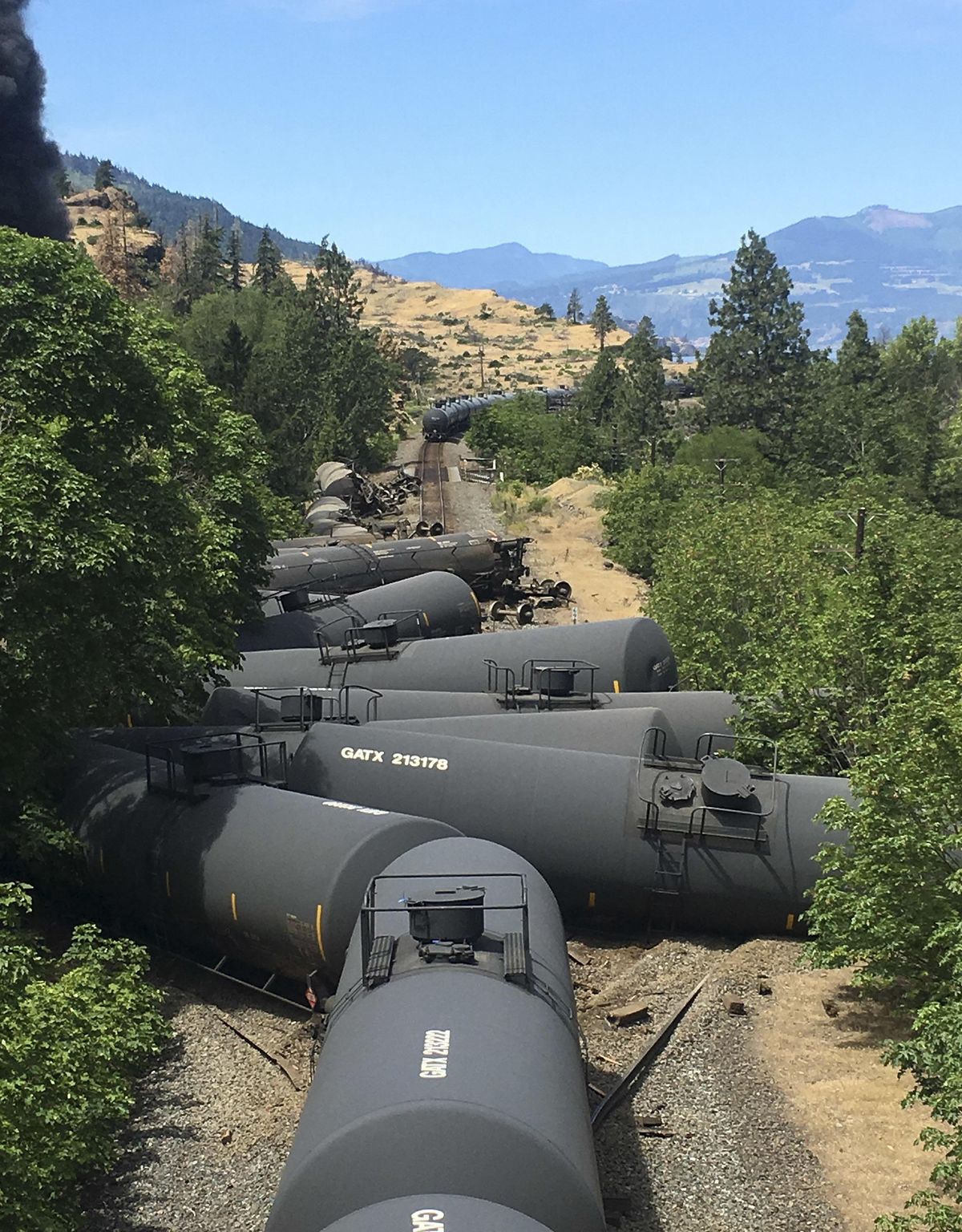Oil train that derailed near Hood River passed through Spokane

PORTLAND, Ore. – A train towing cars full of oil derailed Friday in Oregon’s scenic Columbia River Gorge, sparking a fire that sent a plume of black smoke high into the sky and rekindling concerns about the growth of rail oil shipments through the Northwest.
The accident happened around noon near the town of Mosier, about 70 miles east of Portland. It involved eight cars filled with oil, and one was burning, said Ken Armstrong, state Forestry Department spokesman.
Union Pacific spokesman Aaron Hunt said Friday that 11 cars in the 96-car train derailed near the city, which has about 440 residents. There were no fatalities or injuries.
The train was hauling oil from Eastport, Idaho, near the Canadian border and was headed for a refinery in Tacoma, Washington. It would have passed through Sandpoint and downtown Spokane on its journey to the Columbia River Gorge.
The train was carrying crude oil from North Dakota’s Bakken oil fields, which is known to be volatile.
Union Pacific had a hazardous response team and other contractors on the way to contain the oil, Hunt said in an email Friday afternoon. They were bringing foam for the train car that was still burning, air quality-monitoring equipment and oil spill containment booms. It wasn’t immediately clear how much oil was released.
Maia Bellon, director of the Washington Department of Ecology, said no oil had been detected in the Columbia River.
Highway 84 was closed for a 23-mile stretch between The Dalles and Mosier on Friday, and the radius for evacuations was a half-mile.
About 200 students were evacuated from an elementary and middle school near the scene.
Silas Bleakley was working at his restaurant in Mosier when the train derailed.
“You could feel it through the ground. It was more of a feeling than a noise,” he told the Associated Press as smoke billowed from the tankers.
Bleakley said he went outside, saw the smoke and got in his truck and drove about 2,000 feet to a bridge that crosses the railroad tracks.
There, he said he saw tanker cars “accordioned” across the tracks.
Another witness, Brian Shurton, was driving in Mosier and watching the train as it passed by the town when he heard a tremendous noise.
“All of a sudden, I heard ‘Bang! Bang! Bang!’ like dominoes,” he said.
He, too, drove to the bridge overpass to look down and saw the cars flipped over before a fire started in one of the cars, and he called 911, he said.
“The train wasn’t going very fast. It would have been worse if it had been faster,” said Shurton, who runs a windsurfing business in nearby Hood River.
Oil train traffic has grown rapidly in recent years. Fracking produced oil boom towns on the Northern Plains and existing pipelines couldn’t keep up with demand. Railroads began shipping crude oil to refineries and terminals on the West Coast.
“Moving oil by rail constantly puts our communities and environment at risk,” said Jared Margolis, an attorney at the Center for Biological Diversity in Eugene, Oregon.
Paul Lumley, executive director of the Columbia River Inter-Tribal Fish Commission, called the derailment a reminder “we should be reducing, not increasing the number of oil and coal trains along the river.”
Matt Lehner, a spokesman from the Federal Railroad Administration, said a team of investigators was headed to the scene of the derailment from Vancouver, Washington.
The Associated Press and staff writer Becky Kramer contributed to this report.